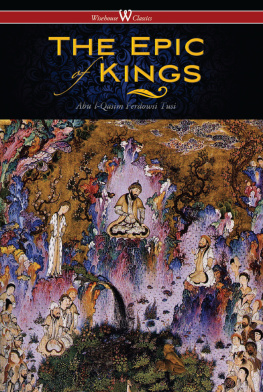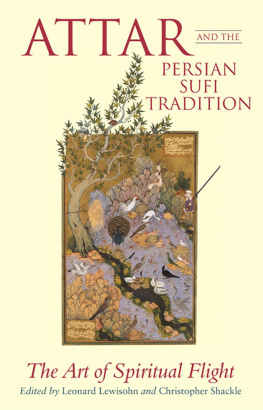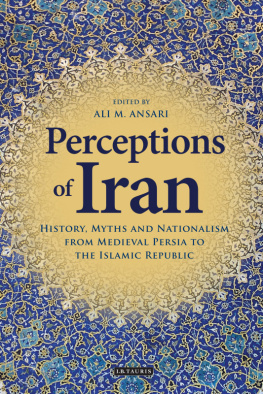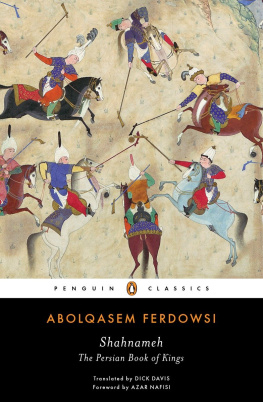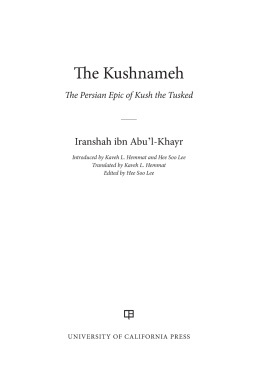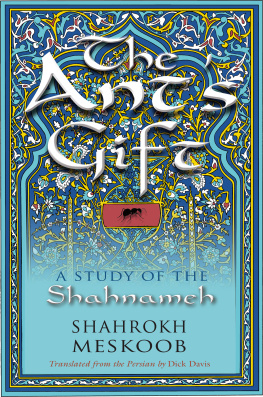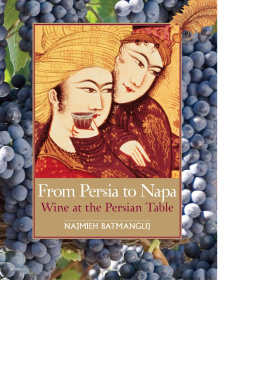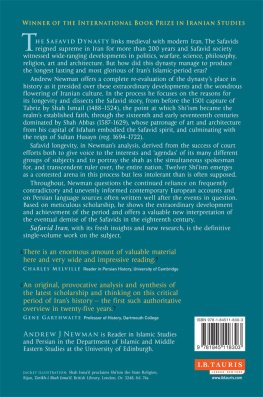The Epic of Kings Hero Tales of Ancient Persia
Abul-Qasim Ferdowsi Tusi
Translated by Helen Zimmern
Front cover image: Sultan-Muhammad, Court of Gayumars, folio 20 verso of the Shahnama of Shah Tahmasp, from Tabriz, Iran, ca. 15251535.
Executive Editor
Sam Vaseghi
Published by Wisehouse Classics Sweden
ISBN 978-91-7637-266-1
Wisehouse Classics is a Wisehouse Imprint.
Wisehouse 2017 Sweden
www.wisehouse-classics.com
Without limiting the rights under copyright reserved above, no part of this publication may be reproduced, stored in or introduced into a retrieval system, or transmitted, in any form or by any means (electronic, mechanical, photographing, recording or otherwise), without the prior written permission of the publisher.
K AIUMARS FIRST SAT UPON THE THRONE OF PERSIA, AND WAS MASTER OF the world. He took up his abode in the mountains, and clad himself and his people in tiger-skins, and from him sprang all kindly nurture and the arts of clothing, till then unknown. Men and beasts from all parts of the earth came to do him homage and receive laws at his hands, and his glory was like to the sun. Then Ahriman the Evil, when he saw how the Shahs honour was increased, waxed envious, and sought to usurp the diadem of the world. So he bade his son, a mighty Deev, gather together an army to go out against Kaiumers and his beloved son Saiamuk and destroy them utterly.
Now the Serosch, the angel who defendeth men from the snares of the Deevs, and who each night flieth seven times around the earth that he may watch over the children of Ormuzd, when he learned this, appeared like unto a Peri and warned Kaiumers. So when Saiamuk set forth at the head of his warriors to meet the army of Ahriman, he knew that he was contending against a Deev, and he put forth all his strength. But the Deev was mightier than he, and overcame him, and crushed him under his hands.
When Kaiumers heard the news of mourning, he was bowed to the ground. For a year did he weep without ceasing, and his army wept with him; yea, even the savage beasts and the birds of the air joined in the wailing. And sorrow reigned in the land, and all the world was darkened until the Serosch bade the Shah lift his head and think on vengeance. And Kaiumers obeyed, and commanded Husheng, the son of Saiamuk, Take the lead of the army, and march against the Deevs. And the King, by reason of his great age, went in the rear. Now there were in the host Peris; also tigers, lions, wolves, and other fierce creatures, and when the black Deev heard their roaring he trembled for very fear. Neither could he hold himself against them, and Husheng routed him utterly. Then when Kaiumers saw that his well-beloved son was revenged he laid him down to die, and the world was void of him, and Husheng reigned in his stead.
Now Husheng was a wise man and just, and the heavens revolved over his throne forty years. justice did he spread over the land, and the world was better for his reign. For he first gave to men fire, and showed them how to draw it from out the stone; and he taught them how they might lead the rivers, that they should water the land and make it fertile; and he bade them till and reap. And he divided the beasts and paired them and gave them names. And when he passed to a brighter life he left the world empty of a throne of power. But Tahumers, his son, was not unworthy of his sire. He too opened the eyes of men, and they learned to spin and to weave; and he reigned over the land long and mightily. But of him also were the Deevs right envious, and sought to destroy him. Yet Tahumers overcame them and cast them to earth. Then some craved mercy at his hands, and sware how they would show him an art if he would spare them, and Tahumers listened to their voice. And they taught him the art of writing, and thus from the evil Deevs came a boon upon mankind.
Howbeit when Tahumers had sat upon the golden throne for the space of thirty years he passed away, but his works endured; and Jemshid, his glorious son, whose heart was filled with the counsels of his father, came after him. Now Jemshid reigned over the land seven hundred years girt with might, and Deevs, birds, and Peris obeyed him. And the world was happier for his sake, and he too was glad, and death was unknown among men, neither did they wot of pain or sorrow. And he first parcelled out men into classes; priests, warriors, artificers, and husbandmen did he name them. And the year also he divided into periods. And by aid of the Deevs he raised mighty works, and Persepolis was builded by him, that to this day is called Tukht-e-Jemsheed, which being interpreted meaneth the throne of Jemshid. Then, when these things were accomplished, men flocked from all corners of the earth around his throne to do him homage and pour gifts before his face. And Jemshid prepared a feast, and bade them keep it, and called it Neurouz, which is the New Day, and the people of Persia keep it to this hour. And Jemshids power increased, and the world was at peace, and men beheld in him nought but what was good.
Then it came about that the heart of Jemshid was uplifted in pride, and he forgot whence came his weal and the source of his blessings. He beheld only himself upon the earth, and he named himself God, and sent forth his image to be worshipped. But when he had spoken thus, the Mubids, which are astrologers and wise men, hung their heads in sorrow, and no man knew how he should answer the Shah. And God withdrew his hand from Jemshid, and the kings and the nobles rose up against him, and removed their warriors from his court, and Ahriman had power over the land.
Now there dwelt in the deserts of Arabia a king named Mirtas, generous and just, and he had a son, Zohak, whom he loved. And it came about that Ahriman visited the palace disguised as a noble, and tempted Zohak that he should depart from the paths of virtue. And he spake unto him and said
If thou wilt listen to me, and enter into a covenant, I will raise thy head above the sun.
Now the young man was guileless and simple of heart, and he sware unto the Deev that he would obey him in all things. Then Ahriman bade him slay his father, for this old man, he said, cumbereth the ground, and while he liveth thou wilt remain unknown. When Zohak heard this he was filled with grief, and would have broken his oath, but Ahriman suffered him not, but made him set a trap for Mirtas. And Zohak and the evil Ahriman held their peace and Mirtas fell into the snare and was killed. Then Zohak placed the crown of Thasis upon his head, and Ahriman taught him the arts of magic, and he ruled over his people in good and evil, for he was not yet wholly given up to guile.
Then Ahriman imagined a device in his black heart. He took upon himself the form of a youth, and craved that he might serve the King as cook. And Zohak, who knew him not, received him well and granted his request, and the keys of the kitchen were given unto him. Now hitherto men had been nourished with herbs, but Ahriman prepared flesh for Zohak. New dishes did he put before him, and the royal favour was accorded to his savory meats. And the flesh gave the King courage and strength like to that of a lion, and he commanded that his cook should be brought before him and ask a boon at his hands. And the cook said
If the King take pleasure in his servant, grant that he may kiss his shoulders.
Now Zohak, who feared no evil, granted the request, and Ahriman kissed him on his shoulders. And when he had done so, the ground opened beneath his feet and covered the cook, so that all men present were amazed thereat. But from his kiss sprang hissing serpents, venomous and black; and the King was afraid, and desired that they should be cut off from the root. But as often as the snakes were cut down did they grow again, and in vain the wise men and physicians cast about for a remedy. Then Ahriman came once again disguised as a learned man, and was led before Zohak, and he spake, saying

